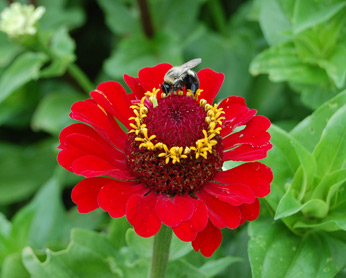Attracting Bees to Your Garden
Understanding Bees
The first thing you need to know is that when bees are out and about, pollinating 30% of our crop population and 90% of our wild plant population, they are not doing it to supply us with fruits, vegetables, and attractive flowers to look at; they are scavenging for food. Nectar and pollen to be more specific. The cross-pollination that many plants need to produce a fruit is solely a by-product of their endeavours.
As a bee rummages around inside a flower, collecting fodder for the hive (or themselves if they are solitary bees), some pollen will become stuck between the hairs that coat the bee’s tiny body. When the bee moves to the next flower, some of the trapped pollen will fall off into the new flower. This is called cross-pollination and is essential for many flowers to produce seeds.
Attracting Bees
We have a great number of native and non-native bees in Canada. Unlike many other non-native species though, bees don’t seem to be invasive. That is, they can survive and possibly thrive here without hindering other species around them. The honeybee, the ones that are used predominantly on farms across the country, were brought to Canada for the first time in the 1820s by settlers who understood their importance to a successful harvest.
Attracting native bees is not a difficult task: simply plant native plants. It only makes sense that native bees would be attracted to the plants that they have known for hundreds if not thousands of years.
Here is my go-to plant list for increasing the bee population in the area, compliments of the David Suzuki Foundation:
| Early | Mid-season | Late |
| Blueberry | Blackberry | Aster (perennial) |
| Cotoneaster | Cat mint | Beggar’s tricks |
| Crabapple | Catnip | Borage |
| Cranberry | Chives | Coneflower |
| Crocus | Dahlia | Cornflower |
| Foxglove | Hyssop | Cosmos |
| Heliotrope | Lavender | Goldenrod |
| Hazelnut | Raspberry | Pumpkin |
| Heather | Sunflower | Sedum |
| Primrose | Yarrow | Squash |
Of course, you must remember that chemicals of any sort, can be harmful so keep them out of your garden, off of your lawn, and encourage your neighbours to do the same.




